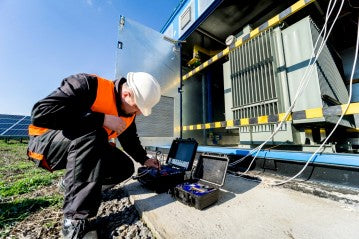
Can Hybrid Inverter Work Without Battery?
Hybrid inverters are devices that can manage both solar panels and batteries, allowing you to store excess solar energy for later use. But what if you don't have or want batteries? Can hybrid inverters work without batteries? The answer is yes, but there are some trade-offs and limitations that you should be aware of. In this blog post, we will explain how hybrid inverters work, what are the benefits and drawbacks of using them without batteries, and what are some alternatives that you can consider.
How do hybrid inverters work?
Hybrid inverters are essentially a combination of two types of inverters: grid-tied and off-grid. Grid-tied inverters are the most common type of inverters used in solar energy systems. They convert the direct current (DC) electricity produced by solar panels into alternating current (AC) electricity that can be used by your appliances or fed back to the grid. Off-grid inverters are used in standalone systems that are not connected to the grid. They also convert DC to AC, but they also have a built-in charge controller that can regulate the charging and discharging of batteries.
Hybrid inverters can perform both functions: they can connect to the grid and export excess solar energy, or they can disconnect from the grid and use batteries as a backup power source in case of a blackout. Hybrid inverters can also optimize the use of solar energy and batteries according to your preferences and needs. For example, you can program your hybrid inverter to use solar energy first, then battery power, and then grid power. Or you can set it to charge your batteries only when the grid electricity price is low, and discharge them when the price is high.
What are the benefits of using hybrid inverters without batteries?
One of the main benefits of using hybrid inverters without batteries is that you can still enjoy the advantages of a grid-tied system, such as reducing your electricity bills, earning feed-in tariffs or net metering credits, and having a backup power source in case of a grid failure. Hybrid inverters are also more flexible and future-proof than grid-tied inverters, as they allow you to add batteries later on if you decide to do so. Hybrid inverters are also compatible with different types of batteries, such as lead-acid or lithium-ion, giving you more options to choose from.
Another benefit of using hybrid inverters without batteries is that you can save on the upfront and maintenance costs of batteries. Batteries are one of the most expensive components of a solar energy system, and they also have a limited lifespan and require regular replacement and maintenance. By using hybrid inverters without batteries, you can reduce your initial investment and avoid the hassle of battery management.
What are the drawbacks of using hybrid inverters without batteries?
One of the main drawbacks of using hybrid inverters without batteries is that you will not be able to store excess solar energy for later use. This means that you will have to rely on the grid for your electricity needs when there is no sun or when your solar production is lower than your consumption. This can limit your energy independence and reduce your savings potential, especially if you have high electricity demand during peak hours or at night.
Another drawback of using hybrid inverters without batteries is that you will not be able to take full advantage of the smart features and functions of hybrid inverters. Hybrid inverters can offer more control and optimization over your solar energy system than grid-tied inverters, such as load shifting, peak shaving, time-of-use tariffs, demand response, etc. However, these features require batteries to work effectively, as they involve storing and releasing energy at optimal times. Without batteries, you will not be able to benefit from these features and maximize your return on investment.
What are some alternatives to using hybrid inverters without batteries?
If you want to use hybrid inverters without batteries, you should be aware of the trade-offs and limitations that come with this option. However, there are some alternatives that you can consider if you want to have more storage capacity and functionality for your solar energy system.
1. One alternative is to use a hybrid inverter with a small battery bank.
This way, you can still have some storage capacity for backup power or load shifting purposes, while keeping your costs and maintenance low. You can also expand your battery bank later on if you need more storage capacity.
2. Another alternative is to use a grid-tied inverter with a smart energy management system.
This system can monitor your solar production, grid consumption, and load demand, and optimize your energy usage accordingly. You can also program the system to switch between different tariff rates or grid modes, depending on your preferences and needs. A smart energy management system can help you reduce your reliance on the grid and save money on your electricity bills.
3. A third alternative is to use a microgrid system that combines solar panels, hybrid inverters, batteries, and other renewable energy sources.
A microgrid is a small-scale power network that can operate independently or in parallel with the main grid. A microgrid can provide you with more energy security, reliability, and resilience, as well as lower your carbon footprint and environmental impact.
These are some of the alternatives to using hybrid inverters without batteries. Each option has its own advantages and disadvantages, depending on your goals, budget, and situation. You should consult with a professional solar installer to find out which option is best for you.


0 Kommentare